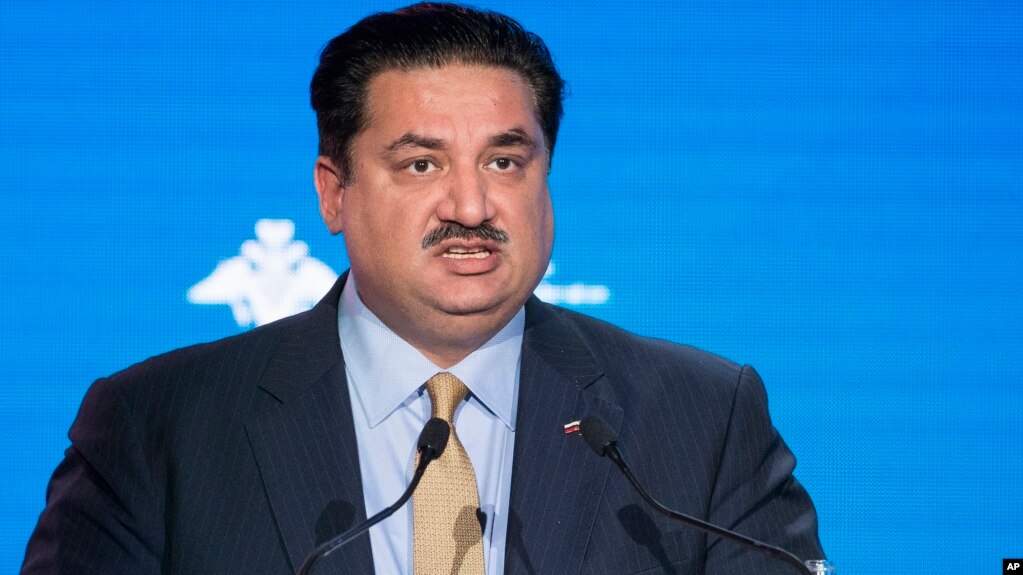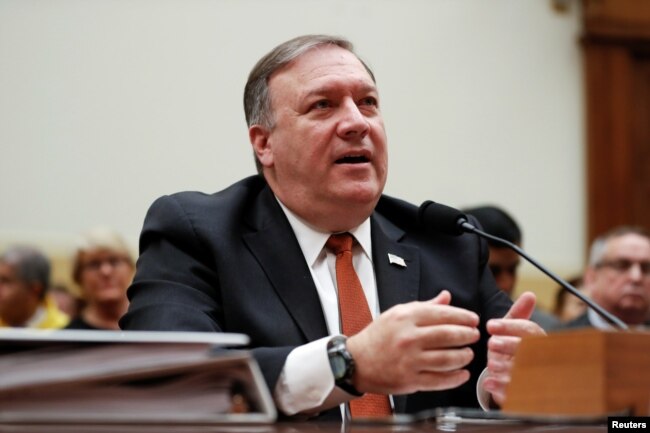-
Ayaz Gul

Foreign Minister Khurram Dastgir Khan made the remarks to VOA exclusively a day before an international task force is to place Pakistan on a terrorism-financing watch list at the urging of U.S. President Donald Trump’s administration, a move likely to fuel Pakistan’s economic troubles.
The Paris-based Financial Action Task Force, or FATF decided in February to include Pakistan in its so-called “gray list” of nations that are not doing enough to curb terrorism financing.
The U.S.-led punitive move was part of Trump’s South Asia strategy he announced in August to pressure Pakistan to cut alleged ties to the Taliban and other terrorist groups waging deadly attacks on American forces in Afghanistan.
Islamabad denies charges it supports any terrorist groups and rejects “U.S. pressure tactics” as an attempt to blame Pakistan for international failures to end the Afghan conflict.
Bilateral relations have deteriorated to a point where no high-level interaction is happening these days between the two long time allies, Khan told VOA in a wide-ranging interview.
“We have reached an impasse in which we have this very strictly formal diplomatic communication is happening, so the U.S. ambassador in Islamabad comes and speaks to us in the Foreign Office and our ambassador in Washington goes and speaks to the State Department. But that’s not really communication, the two countries are not speaking to each other,” Khan said
Communication issues
He blamed the Trump administration’s “adamant” refusal to communicate for “the low ebb” in mutual ties.
“At the moment Pakistan is not being heard. Pakistan is just being vilified and castigated in Washington without being heard at all. It is this situation.”
The only communication that currently exists apart from the formal diplomatic interaction, Khan said, is that U.S. CENTCOM commander General John Votel has been speaking to Pakistan’s army chief, General Qamar Javed Bajwa.
“Formally Pakistan is still a major non-NATO ally and for the United States to actively target Pakistan in FATF, trampling over all regulations and precedents is by necessity forcing us to rethink,” lamented the Minister.
Pakistan is required under an agreement with FATF reached in February to work on an action plan to get itself removed from the gray list, otherwise the county faces the danger of being moved to the so-called “black list” of nations.
Pakistan’s crisis-marred relationship suffered a serious blow on May 11 when Washington barred Pakistani diplomats in the United States from traveling beyond 40-kilometer radius from their posts without permission.
Islamabad responded by imposing a similar “permission regime” on American diplomats in the country. It also went a step further and withdrew a set of unilateral concessions Pakistani had granted Washington as a partner in “the war on terrorism” to ensure security cover for U.S. diplomats and officials in the country.
Diplomatic disagreement
Secretary of State Mike Pompeo last week told U.S. lawmakers American diplomats were being badly treated in Pakistan, charges Islamabad denied.
Pakistan has been receiving billions of dollars in financial assistance since joining the U.S.-led war on terrorism 17 years ago.
Khan, who also heads the defense ministry, acknowledged that American civilian and military financial assistance programs have over the years helped Islamabad meet its crucial budgetary shortfalls. But the expected financial support from Washington this year, he said, has dropped to ‘zero’ for the first time in a decade.
Minister Khan noted, however, that despite all the tensions and bitterness in mutual ties, Pakistan has kept its ground and air lines of communications open for U.S. and allied nations to ferry supplies to their troops in landlocked Afghanistan.
“Yes, we have to consider all options that are in front of us because it would appear to us that the U.S. is following what can be termed a non-violent compellence ((compellence is defined as the ability of one state to coerce another state into action, usually by threatening punishment. American economist Thomas C. Schelling, who won the Nobel Prize for Economics in 2005, coined the word in his book 1966 Arms and Influence.)) of Pakistan,” the minister said when asked whether his country is close to shutting down the supply lines.
The U.S. State Department had no immediate comment but U.S. Marine Lieutenant General Kenneth McKenzie, director of the Joint Staff, said the the supply lines remain open. “I’m not in a position to talk about what they may or may not have said at the diplomatic level but I can tell you at the military level, those lines remain open and stuff’s continuing to flow across them,” he told reporters Thursday.
International forces heavily rely on Pakistani routes to haul supplies. Islamabad closed them once before, after a 2011 U.S. airstrike “mistakenly” killed two dozen Pakistani soldiers.
The action had forced the United States and NATO for months to use a mix of ground and sea routes called the Northern Distribution Network (NDN) running through other countries, including Russia.
But in the wake of Washington’s current tensions with Moscow analysts are skeptical whether NDN, though a much more costly and time consuming option, can still be availed under the circumstances.
Foreign Minister Khan underscored the need for the two countries to communicate and speak to each other despite maintaining divergent views on the war in Afghanistan, the longest in U.S. history.
“The fact that that longest (U.S.) war shows no sign of turning positive for the U.S. is all the the more reason that whatever differences or grievances we might have Pakistan and the U.S. should be communicating at different levels… because ultimately this is a relationship, at least in our view, bigger than Afghanistan and has been bigger than Afghanistan.”
Terror fight
Khan said at a time when U.S. and Western partners have “abandoned Pakistan to terrorism” and continue to ignore his country’s “unprecedented” sacrifices in fighting terrorist groups, Islamabad’s traditional ally China has stood by it and brought billions of dollars in historic direct Chinese investment.
“Russians are essentially (also) walking into a vacuum created by the absence of our American friends,” the minister said pointing to Pakistan’s rapidly improving relations with old rival Russia.
At a public talk in Washington last week, John Sopko, the U.S. Inspector General for Afghanistan Reconstruction (SIGAR), stopped short of dismissing Washington’s narrative of singling out Pakistan for the Afghan military stalemate.
“We keep referring to Pakistan as being the key problem. But the problem also was that the Afghan government at times was viewed very negatively by their local people and what you really need is to insert a government that the people support, a government that is not predatory, a government that is not a bunch of lawless warlords,” observed Sopko.
He went on to say that the U.S. policy of pouring in billions of dollars in these unstable environments contributed to the problem of creating more warlords and powerful people who took the law into their own hands.
“In essence, the government we introduced, particularly some of the Afghan local police forces, which were nothing other than warlord militias with some uniforms on, were just as bad as the terrorists before them,” said Sopko who is overseeing U.S. spending to identify fraud and to prevent it.
VOA National Security correspondent Jeff Seldin and State Department correspondent Nike Ching contributed to this report

